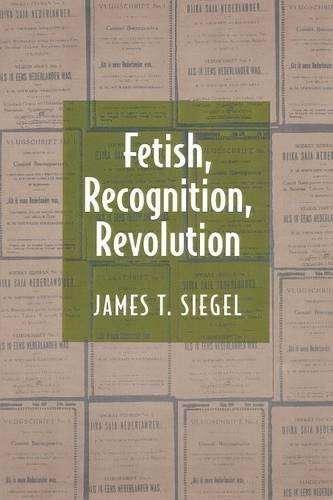Overview
This text is concerned with the role of language in the Indonesian revolution. It traces the beginnings of the revolution, which ended Dutch colonial rule, to the last part of the 19th century, at which time the peoples of the Dutch East Indies began to translate literature from around the world. Siegel discovers in that moment a force within communication more important than the specific messages it conveyed. The subsequent containment of this linguistic force he calls the ""fetish of modernity"", which, like other fetishes, was thought to be able to compel events. Here, the event is the recognition of the bearer of the fetish as a person of the modern world. The taming of this force in Indonesian nationalism and the continuation of its wild form in the revolution are the major subjects of the book. Material examined comes from Indonesian and Dutch sources, as well as first-person accounts of the revolution.
Full Product Details
Author: James T. Siegel
Publisher: Princeton University Press
Imprint: Princeton University Press
Dimensions:
Width: 15.20cm
, Height: 1.60cm
, Length: 23.50cm
Weight: 0.425kg
ISBN: 9780691026527
ISBN 10: 0691026521
Pages: 288
Publication Date: 06 March 1997
Audience:
Professional and scholarly
,
College/higher education
,
Professional & Vocational
,
Tertiary & Higher Education
Format: Paperback
Publisher's Status: Active
Availability: Manufactured on demand

We will order this item for you from a manufactured on demand supplier.
Language: English
Reviews
Siegel's analysis is convincing. It summoned Sumatran recollections of creating urban modernity through adopting music, clothing, language, and books from European sources, yet perceiving these new elements as effortlessly translated into a new Indonesian cultural world. Choice
Siegel's analysis is convincing. It summoned Sumatran recollections of creating urban modernity through adopting music, clothing, language, and books from European sources, yet perceiving these new elements as effortlessly translated into a new Indonesian cultural world. --Choice
Siegel's analysis is convincing. It summoned Sumatran recollections of creating urban modernity through adopting music, clothing, language, and books from European sources, yet perceiving these new elements as effortlessly translated into a new Indonesian cultural world. --Choice Siegel's analysis is convincing. It summoned Sumatran recollections of creating urban modernity through adopting music, clothing, language, and books from European sources, yet perceiving these new elements as effortlessly translated into a new Indonesian cultural world. --Choice
Siegel's analysis is convincing. It summoned Sumatran recollections of creating urban modernity through adopting music, clothing, language, and books from European sources, yet perceiving these new elements as effortlessly translated into a new Indonesian cultural world. -- Choice
Author Information
James T. Siegel is Professor of Anthropology and Asian Studies at Cornell University. He is the author of The Rope of God; Shadow, and Sound: The Historical Thought of a Sumatran People; and Solo in the New Order: Language and Hierarchy in an Indonesian City (Princeton).




